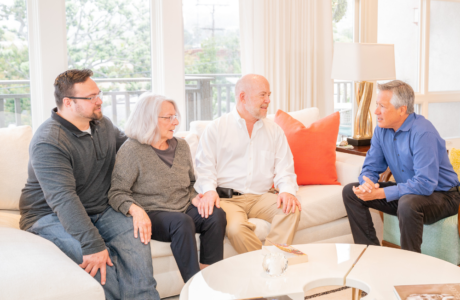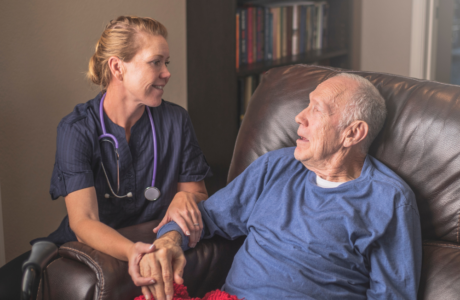
Grief: A Universal Experience
Grief is a universal experience, as loss is an inevitable part of life. Grief knows no bounds or limitations, and it manifests in a myriad of ways, sometimes catching us off guard in the most unexpected places and at the most unexpected times – like the workplace or social settings.
One of the most potent truths when it comes to grief is that the journey through grief is unique for everyone. Whether it’s a wave that crashes into you and knocks you right over or a gentle nudge that won’t go away, learning how to cope with grief and its symptoms can help you cultivate the resilience to continue forward in the face of loss.
Here are a few things you can do to help you manage your grief as it arises:
1. When you feel emotions of grief coming on while they’re at work or in social settings, take care of yourself in the moment.
Emotions of grief can surface at any time, especially in the early years following a loss. They can be intense and difficult to contain or manage. For the healing process, it’s important to feel them, but what if they come up at a time when it doesn’t feel appropriate to just let go?
The first thing is to know yourself and your environment. Everyone’s workplace culture and community are different. If you’re in a supportive environment, it may be appropriate to take a break and spend some time with yourself or in connection with a friend or colleague. If that’s not available or appropriate, you can excuse yourself, find a private space and do what you can to take care of yourself in the moment – by feeling what’s coming up, reaching out to a loved one for support, or engaging a coping mechanism to regain emotional equilibrium.
2. The physical symptoms of grief, such as fatigue, aches and pains, and insomnia can be amplified by avoidance, while acceptance, although difficult, can help us release the pain.
Grief is a natural experience that touches everyone, though not always in the same ways. The pain of grief can be frightening and difficult to deal with. Like everything else in life, the symptoms of grief are temporary. They may be excruciating or overwhelming in the moment, but we can trust that they will pass. Accepting that it may be a challenging and painful journey is the first step to getting through it. Like everything else in life, grief is temporary. When we stop resisting the pain, it moves through us more quickly and ultimately releases itself.
Thich Nhat Hanh spoke of two arrows in life: the first arrow is the circumstance that causes pain, the second our response to it. When something unwelcome happens in our lives, we can choose how we relate to it. When we can accept it and let it pass, supporting ourselves as it moves through us, we only experience the pain of the first arrow. When we react to it with fear, judgment, frustration, indignance and avoidance, we amplify the pain by attempting to change the circumstance and resisting the pain it evokes. The lesson here is to accept the loss, the deep pain and sorrow of it, and allow ourselves to hurt rather than rebelling against it.
It’s important to remember that each grief journey is unique, and emotions and experiences that grief brings are temporary. Some grieving experiences are more intensely painful and disruptive to our lives than others. If symptoms of grief are impairing your ability to function in daily life, it may be valuable to engage professional support.
3. Find healthy ways to express your grief, especially if you’re not comfortable or able to talk about your feelings with others.
There are many healthy ways to express and release grief. While many people benefit from sharing their stories and connecting with others, others prefer to navigate their grief privately. Feelings can be expressed through creative arts such as writing, painting, poetry, drawing, design, photography and more; through movement and somatic practices such as walking, dancing, running, hiking, yoga, going to the gym, swimming and other activities; and most importantly through feeling and expressing the emotions grief bring. It’s ok to let it all out, and important to find safe ways to do that. Practices such as meditation, prayer and quiet reflection can also help to cope with and detach from feelings as they arise, especially when they are overwhelming.
4. Seeking professional help for grief can be invaluable.
Grief is a powerful and common human experience that is often misunderstood. There’s no need to suffer a deeply confusing and painful time in life alone. If you or someone you know is experiencing overwhelming symptoms of grief, struggling to navigate the waves of emotions or simply looking for ways to feel less alone in the journey, it may be valuable to seek professional help. Grief counselors offer connection that softens the pain and isolation of loss, guidance that contextualizes each unique journey, and support that eases the pain of loss and encourages the possibility of new life.
As Empowered Endings works to reshape the way we approach the End of Life Care, we also hope to reshape how we speak about loss, how we support those who experience it and ease some of the sufferings of those who are in the midst of it.
To learn more about how we support patients and loved ones, visit our medical group page.





